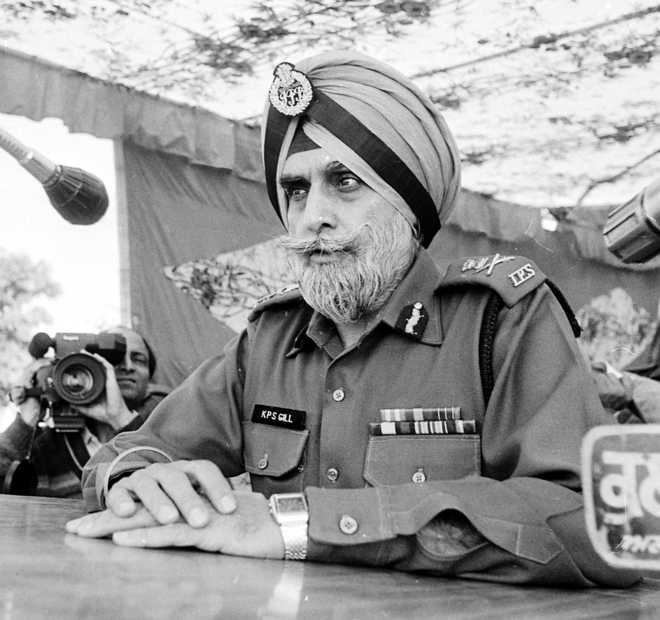THE demise of Kanwar Pal Singh Gill, the "Terminator of Khalistani Terrorism" has led to an outpouring of glowing tributes. He was indeed a limited-edition supercop, nearly an extinct breed. He was ruthless, innovative, focussed yet perceptive. Above all, a successful one and everyone loves successful and lucky generals — even if they have an odd weakness. After the Mizoram hybrid model, he steered the only successful hard power-centric conflict-resolution model, probably serving as an inspiration for the recent, even more ruthless, Sri Lankan model. Gill Sahib left us at a time when the relevance of his tactics is being rearticulated in south Kashmir.
As a young Brigade Major, I had the privilege to brief him after a joint encounter at Shatrana-Patran, where we had eliminated a top-ranking terrorist. I recall the current DGP, Suresh Arora as a young SSP being part of that briefing. The “Police General” impressed us with his incisive knowledge of terrain and cadres.
The second time, after an year, I hosted him for an impromptu lunch at the Moharana Canal guesthouse. The Army was de-inducting and when a youngster told him that villagers were beseeching the Army to stay back for big khadkus (militants) having been taken care of, who will save them from the smaller deadly ones in Khaki. There was a hush till Gill Sahib burst out laughing and we realised that this perceptive top cop could certainly take a joke.
Key enablers
In all our eulogising, it will only be fair to spare a thought for two of his key enablers; his predecessor, Julio Riberio, another super top cop but of a different genre, an expert in the art of optimising hard and soft power. The second was the Army under the legendary Western Army Commander, late General BC Joshi. He not only empowered and co-ordinated with the police but willingly remained in the background. There has been a feeling in many quarters that the Army did not get its due but he understood that Army has to remain focussed on its primary role of conventional war and not get bogged down in internal-security complexities. Success has many fathers but Gen Joshi thought of long-term national interests.
As a genuine tribute to KPS, it is high time that in a focussed manner, Central Armed Police Forces (CAPFs) are empowered to take on internal security challenges like Punjab Police. The North-East with Assam Rifles in the lead with formidable state police forces like Nagaland and Manipur in support, is the best place to implement it, in a time-bound manner. As an important corollary, the state police forces just can't abduct their responsibilities and switch off on the deployment of CRPF, otherwise many more Sukhma-like tragedies await us.
Despite his hard power-centric orientation, innovation was intrinsic to the Supercop, as displayed by him in Operation Black Thunder. It is high time the police finds better techniques for crowd control specially Sangbazi or stone-throwing. In our decision-making loop, more technical expertise to track and monitor has to be combined with good old hands-on Humint based on a network of informers. We simply can't afford another Salwinder in sensitive border districts. The answer is implementation of the good-old Prakash Singh Committee recommendations and in Punjab to have more IPS officers in border districts.
Another pitfall is over reliance on gladiators, both at Arambagh (Kathua) and Dinanagar, operations got delayed due to the movement of designated controllers and special teams, who had to travel long distances and by road. While the media has been critical of the Army not pressing on despite cordons being in place yet the benefit of empowering the police and the message across to the other side far outweigh other benefits — especially in an area where the Disturbed Area Act is not in force. Necessary support in terms of machine-gun fire support and bomb disposal after operations by the Army were elements of smart co-operation.
The provision of helicopters for such moves is essential but the most important step is to empower juniors with “every SSP a gladiator,” rather than relying on just a couple of them. Police top officials must also avoid the "fire-brigade syndrome" by rushing to the scene of the first incident because multiple and follow-up attacks cannot be ruled out as was seen at Samba 18 hours after after Arambagh. The suggested remedy is, at the cutting edge, empowered junior commanders controlling operations and utilising technology to livestream the feed to senior commanders at the Police Headquarters control room. RIP great supercop, The nation, specially Punjab, owes an eternal debt of gratitude to you.
The writer is currently Maharaja Ranjit Singh Chair at Panjab University
Unlock Exclusive Insights with The Tribune Premium
Take your experience further with Premium access.
Thought-provoking Opinions, Expert Analysis, In-depth Insights and other Member Only Benefits
Already a Member? Sign In Now










